A mismanaged remodel & a $400K grant pulled: What went wrong with a Garden City housing project
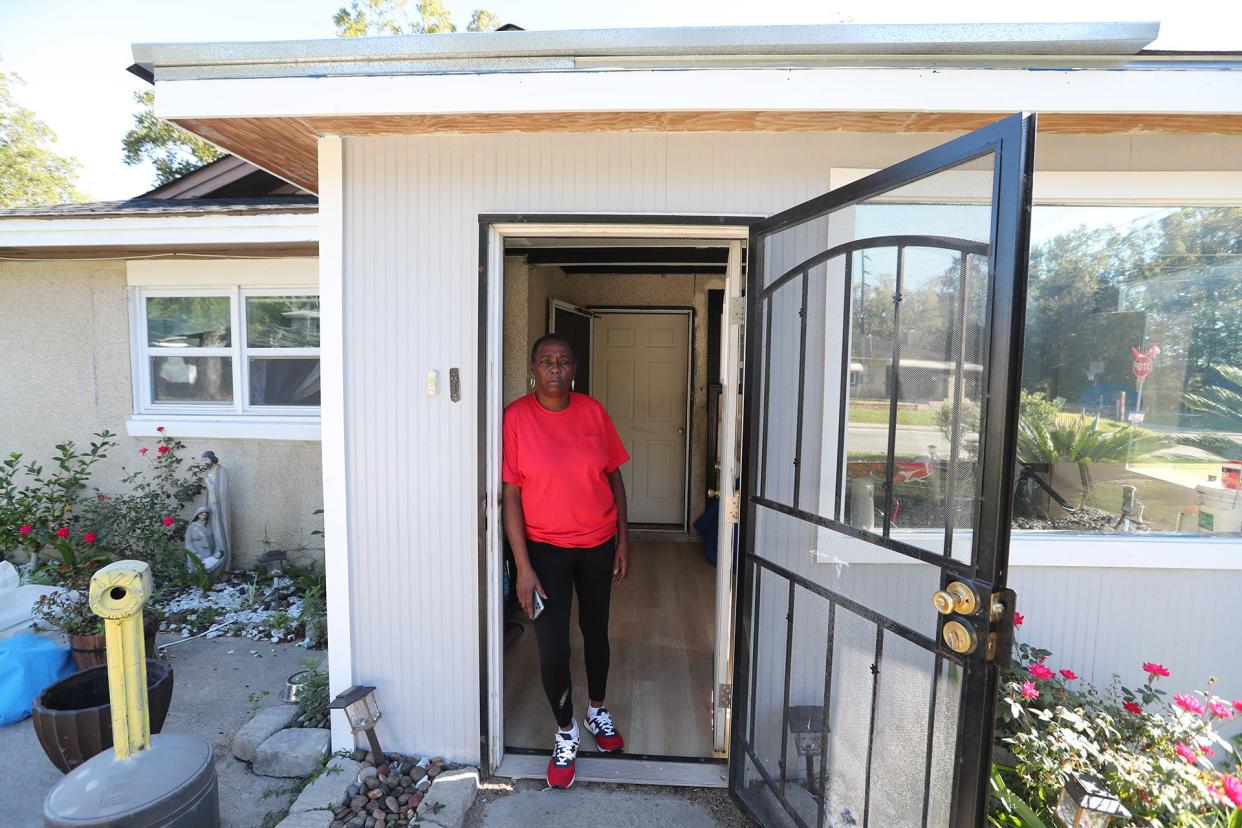
When a Garden City resident got notice she was approved for a grant that would improve the one-story home she inherited from her father, she thought it was a blessing.
Angela’s home is where she raised four children, where she sees a revolving door of 10 grandchildren every week and where she takes care of her teenage granddaughter full-time.
"I thought I was going to be shouting and crying when I moved back in," said Angela, who opted to not use her last name for privacy reasons. "I did cry, just not the way I thought."
The project intended to revitalize Angela’s family house ended with unsatisfactory renovations and the termination of a $400,000 federal grant awarded to the Garden City Housing Team. Although the Georgia Department of Community Affairs stated violations of the program’s regulations as the cause, the nonprofit’s leadership and its grant administrator have conflicting stories about misuse of funds, poor communication and quality of work done on the house.
In 2022, DCA granted GCHT $400,000 to improve homes in the Rossignol Hill neighborhood in Garden City. Six homeowners — including Angela — would receive an allotment of around $66,000 for rehabilitation. The team had up to 90 days to finish approved plans, which included everything the houses needed to be brought to code.
Less than a year after work began on two houses in March 2023, the grant was terminated.
An email sent to the GCHT from the Georgia Housing and Finance Authority stated that after being notified by the third-party grant administrator, Rhonda Gilbert of Gilbert + Associates, reporting of account funds was inconsistent and not submitted in adherence to the grant agreement, which led to a review of accounting of all GCHT project funds.
According to the notification, the GFHA discovered the following:
Commingling of personal funds and Community HOME Investment Program (CHIP) award funds in a single bank account
Unauthorized marketing expenses for radio advertisements totaling $6,000
Unauthorized wire transfer of $30,407 to an unknown account
10 separate improper cash withdrawals
On Jan. 29, the GHFA also requested $25,528 within 72 hours notice, an amount they deemed as the "improperly utilized funds." MonaLisa Monroe, president of GCHT, said "of course" they had sent the money in the three days, but according to DCA communications manager Justin Vining, GHFA has yet to receive it.
Vining said the DCA is continuing to work through the non-compliance protocols regarding GCHT.
According to the letter, GHFA reserves the right to take any and all action in law, equity, or otherwise, which it deems necessary or advisable per the grant agreement to recover the funds requested.
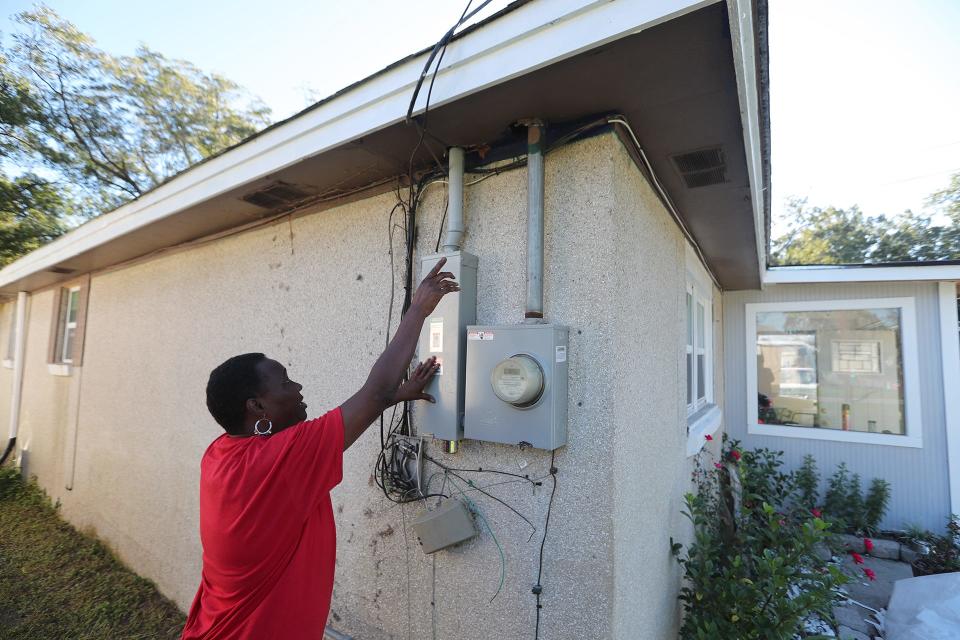
How funds were used, moved during the project
When Monroe and Tonya Payne, treasurer of GCHT, received the grant termination notice, they said they felt upset, confused and shocked.
Monroe believes it was terminated due to complaints from the homeowner, Angela. Like every homeowner who receives the grant, Angela had a form that listed all of the work to be completed, including repairs for plumbing in the bathroom and installing new flooring, a roof and doors.
After months of temporary housing arrangements, she moved back into her home around July 2023 and began communicating concerns to DCA and Gilbert about the quality of the work. Some of the doors didn’t fit in the frames, the ceiling fans that she’d personally installed had been replaced with cheap chandeliers, the plumbing still needed repairing, holes needed to be filled after electric work.
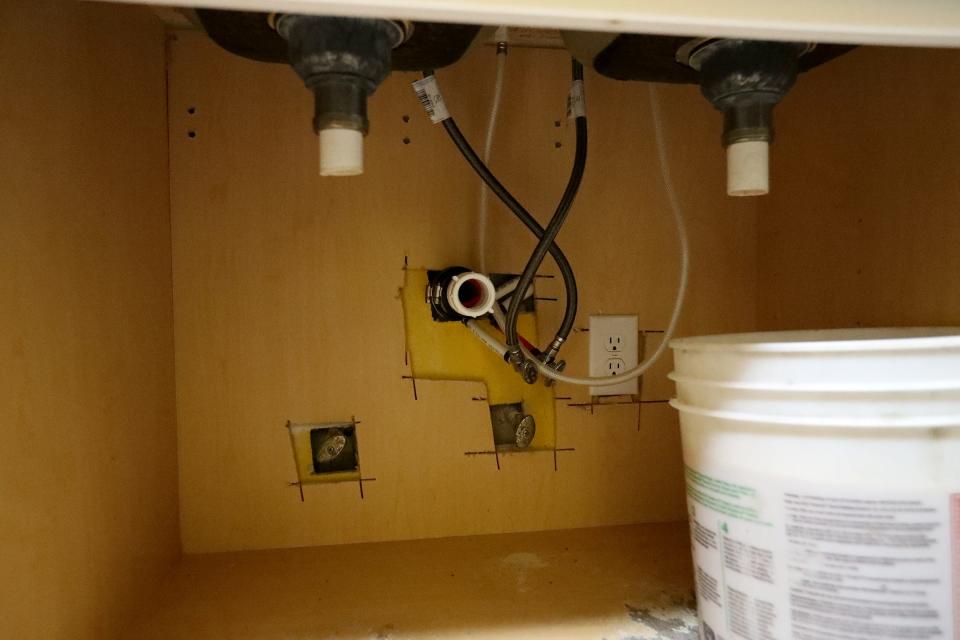
Her form had 29 tasks, including an addition of a master bedroom and bathroom to her house, which was initially approved by DCA then rescinded by the DCA compliance manager who reviewed the work form.
CHIP funds can only be used to bring homes up to code, and an addition that would increase the square footage of her home fell outside of the program's goals.
When Angela was told she wasn’t going to get it, she expressed her dismay about that and the work known to Gilbert and the DCA.
“The fact that you want to terminate it because you’re tired of dealing with the resident or whatever that’s fine,” Monroe said. “But the fact that you’re saying that we owe you or we misappropriated funds, documentation states that that’s not true. And that’s where I feel like it needs to stop.”
Monroe and Payne insist that any oversight comes from the fact that they were new and it was their first time dealing with a project of this magnitude.
According to Monroe’s LinkedIn, she has led at least one other non-profit, CureQuest Leukemia, Inc. in Texas.
Payne emphasized that whatever Gilbert, who has been administering grants since 2001 including when GCHT was first awarded its grant in 2016, told them to do, they did.
"They like to say, ‘we’re new, this is our first grant, we don’t know what we’re doing,’" Gilbert said. “That’s what I do, I provide grant consultation services, I tell them exactly what to do. They don’t have to think when I’m involved. When they were doing all those things, opening and transferring money to unauthorized accounts, they didn’t call me once.”
Although Gilbert maintains that there was regular conversation between the GCHT and her, she alluded that they omitted key details.
For CHIP grantees, one of the main things Gilbert does is prepare a form that specifies how much money would be used from the grant, based on the invoice provided by the general contractor.
Before work begins on any house, the grantee must set up a separate bank account that is meant to be used only for CHIP funds, and turn in the information for that account on a form. GCHT listed an account at Truist.

When Gilbert asked for the first bank statement, there were around 40 transactions when she said there should have been only 11 transactions total. The bank statements showed charges from Chick-fil-A, Food Lion, McDonald's, overdraft fees and more. At this point, the CHIP funds were in the same account as day-to-day operating money.
Later bank statements also show cash withdrawals and Zelle payments that the president and treasurer say were for subcontractors for the project, to pay for supplies or to feed the workers. Payne said sometimes the workers on-site needed materials, so she would go to Home Depot and purchase supplies.
In emails to Gloria Hough, DCA Community Housing grants coordinator, about GCHT financials, Payne tells Hough that Gilbert told GCHT over the phone to “do what they could.” Gilbert denies saying this and approving these purchases in a separate email, stating “this conversation NEVER took place.”
Payne said that Gilbert gave permission for the expenses over the phone.
Gilbert denies approving those purchases.
Under the guidelines of the grant, subcontractors are prohibited from being paid directly by the GCHT and not with cash.
Subcontractors work under the contractor’s license and get paid by the general contractor. The invoices submitted by the general contractor would also include the cost of the supplies.
Payne said once they received the money, she immediately paid the ‘vendors’ through Zelle, which she said Gilbert had told her to do as soon as they received the money from the DCA. To her understanding, those were the people that had done the work.
“Well, you ask me what a vendor is, it’s the person that did the work,” Payne said. “So that's what I did, I paid the people who did the work. It has been broken down to me now that you’re supposed to pay the general contractor the whole grant amount.”
Although work started on two of the six houses in March, no wire transfers from the DCA occurred until May. According to Sharon Bethune, a former GCHT president, it is typical for money to be deposited into a bank account after the first request.
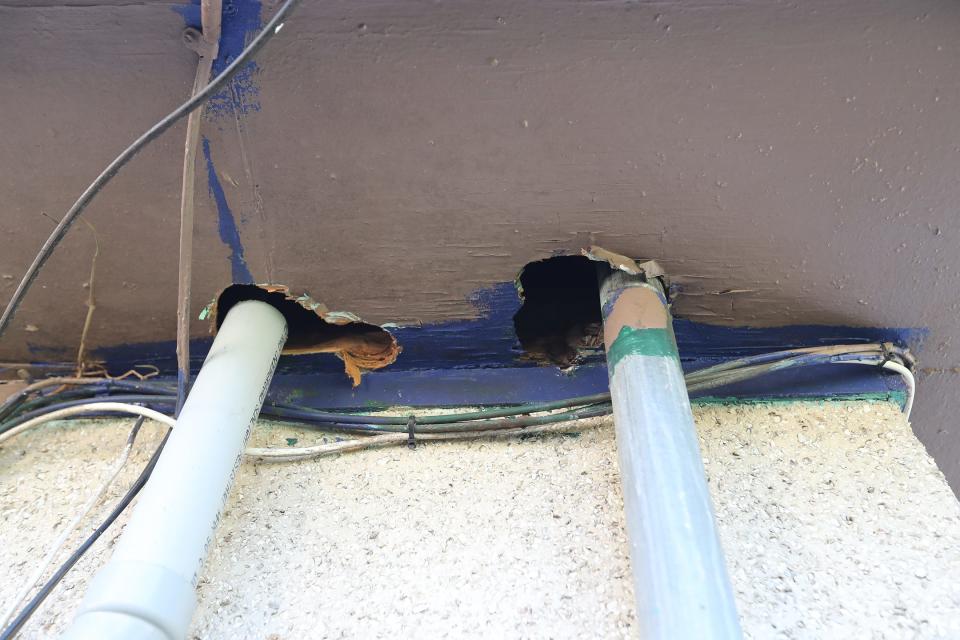
The same month GCHT started receiving money, Payne made an outgoing wire transfer from the GCHT’s general fund account at Truist bank in the amount of $30,407 to a Carver State Bank account on May 16, according to bank statements acquired by the Savannah Morning News.
Payne claims that she opened this CSB account solely for CHIP funds. That account was closed in June after Payne said she realized it was connected to her personal account at CSB, and she had accidentally made $1,300 in purchases on a linked debit card.
She transferred $19,500 of the $30,407 back to the Truist account. The remaining $10,907 she said was used to pay the general contractor $3,000 in cash and $5,000 was made out in two checks to Monroe and Payne for what they said was administrative work.
GCHT should have only received $4,000 in administration fees for the two houses they worked on, and the checks should have been made to GCHT, not individual people.
There were also checks totaling $6,000 to Cumulus Media, which Monroe said is a media and radio station that promoted the CHIP grant for applicants and managed all of their social media pages. However, the advertising ran after the application process was closed.
Payne said they had gotten permission for advertising, which Gilbert denied in the email exchange about GCHT Financials with Hough.Gilbert said the grantee is usually responsible for any fees associated with advertising and CHIP funds were not to be used.
Of the total, $68,283 that was approved by DCA for Angela’s house, more than $25,000 of it was used by Payne and Monroe for radio ads, unauthorized wire transfers, and cash withdrawals, which did not comply with the guidelines of grant.
Additionally, the money was moved between three different bank accounts, one of which was the one connected to Payne’s personal checking account, which led to improper spending and possible overspending of the funds. Payne alleges this was accidental and all funds were returned to the CHIP account. However, it is unclear if the total amount of mishandled funds has been accounted for and the DCA continues to work through its non-compliance issues with GCHT.
'This house is all I got'
Angela’s home in Garden City, built in the 1980s, had issues with electric and plumbing, among a number of other problems.
She made minor fixes and improvements to the old home when she could, but nothing compared to what could be done with a federal grant.
“This house is all I got,” Angela said. “Anytime I’ve got a little piece of money, I try to put it into the house.”
Angela was most excited about the approved master bedroom addition, complete with a closet and handicap bath that would be in the back of the house.
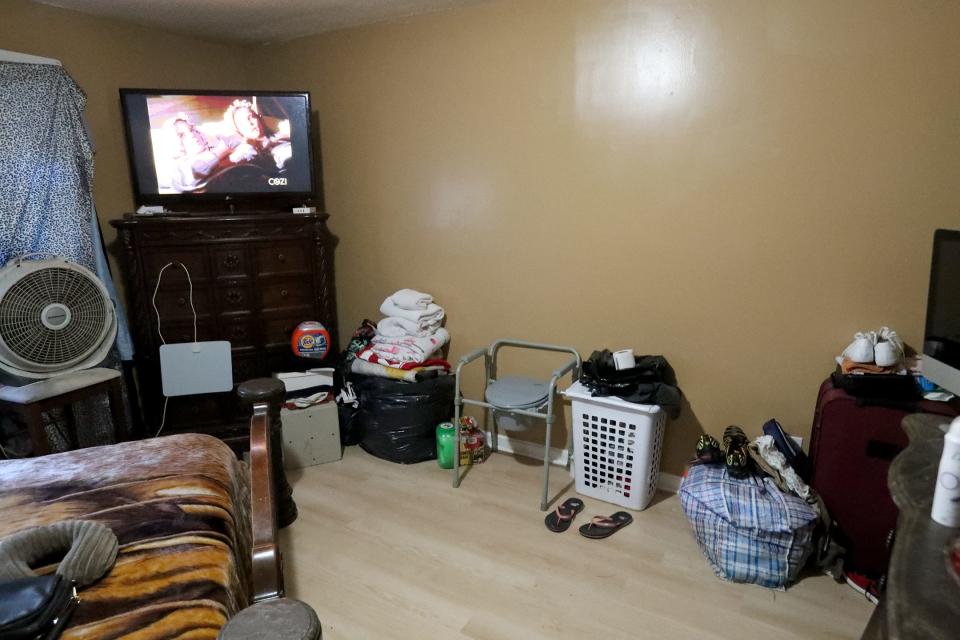
“My wish was for me to get a bath added to my bedroom,” Angela said. “Because I’m in pain all the time.”
Angela used a medical folding toilet that sat in the corner of her bedroom in the front of the house, when she couldn’t make it down the hall to her bathroom.
The work done on her house, which she alleges made it worse off than before, devastated her. The highly anticipated addition that was approved never happened, though the DCA later suggested that just a bathroom be added to assist her.
The DCA and Gilbert are still working with Angela to finish the work to get her house up to code with a different contractor, but no addition is planned or approved for her home. The other four homeowners, however, will not get the chance for their houses to be brought up to code through the grant.
As for the future of the GCHT which has been in existence since 2016, no longer has an active website, and Monroe said she will remain its president until she can find a replacement.
Destini Ambus is the general assignment reporter for Chatham County municipalities for the Savannah Morning News. You can reach her at dambus@gannett.com
This article originally appeared on Savannah Morning News: Garden City Housing Team gets $400K grant revoked by Georgia DCA

